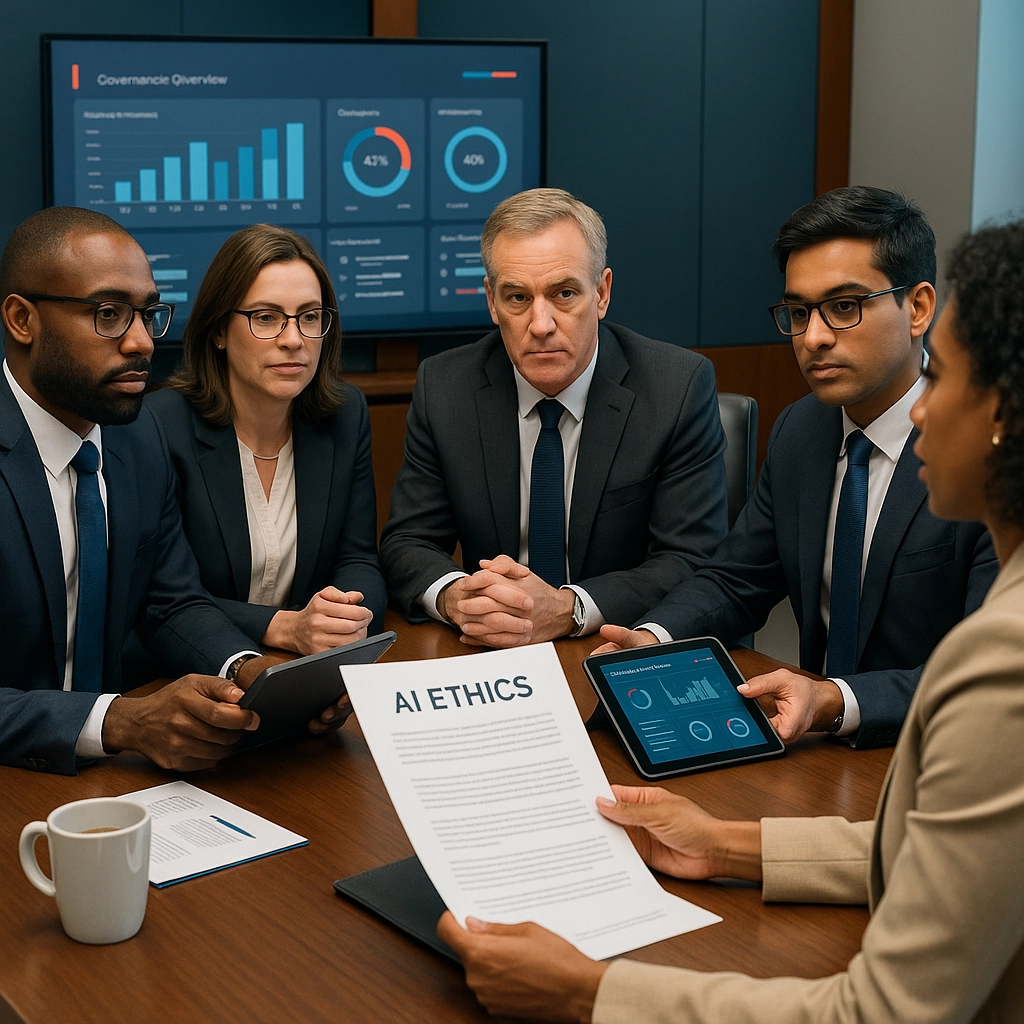
Beyond Buzzwords: How Smart Leaders Are Building Ethical, People-First AI Strategies in 2025

Artificial intelligence isn’t just a boardroom buzzword anymore—it’s the engine driving meaningful shifts in how modern businesses operate, solve problems, and compete in 2025. But here’s the catch: true industry leaders have realized that AI, by itself, means little unless it’s paired with a rock-solid ethical foundation and a human-centric approach.
Why? Because sustainable, high-trust AI adoption is about software built for people, not tech for the sake of tech. Here’s how smart CEOs and executives are championing a new playbook for ethical, people-first AI strategies—leaving the hype in the rearview mirror.
Table of Contents
Establishing Transparent and Explainable AI Systems
If AI is making critical decisions in your business, your team and your customers deserve to know how it works. That’s why forward-looking companies are putting transparency at the top of their AI agendas.
Say goodbye to opaque “black box” models—smart leaders are investing in Explainable AI (XAI), making sure machine decisions can be easily understood, audited, and (if needed) challenged. For example, when a customer’s loan application is declined by an AI system, leaders insist on giving clear, written explanations rooted in fact—not just an automated rejection.
Regular algorithmic audits, bias checks, and explainability documentation are becoming standard. These practices aren’t just about compliance; they’re about building and maintaining trust, both internally and externally. Transparent AI makes it easier to spot and resolve discrimination, bias, or logic errors, ensuring technology supports—not undermines—fairness and equity.

Building Human-Centered AI Collaboration Models
The smartest organizations in 2025 don’t design AI to replace people—they use it to extend human abilities and streamline workflows. The magic happens when tasks are assigned based on what humans and machines do best.
Here's what that looks like in action:
AI crunches data for decision support, but humans make the final call on high-stakes questions (think: healthcare diagnoses, contract approvals, or hiring).
AI-powered chatbots resolve simple customer queries, while trained staff take over for nuanced, sensitive issues.
Teams are taught to become “AI trainers,” supervising, correcting, and refining outputs over time.
And every system rollout is paired with human-in-the-loop quality controls—nothing gets deployed without oversight. This dynamic duo—AI plus empowered people—supercharges productivity, sparks creativity, and keeps organizational values front and center.
Implementing Comprehensive Governance Frameworks
AI ethics isn’t a box to check; it’s an ongoing commitment. The best leaders are weaving governance deeply into their organizational fabric.
Here’s what that means on the ground:
AI ethics committees bring together voices from data science, IT, HR, legal, and operational teams to assess every use case before launch.
When a new AI product is in development, impact assessments probe for unintended consequences—like unfair bias or negative effects on workforce morale.
The latest in cybersecurity protocols keeps proprietary data locked down, and regular “red teaming” security stress-tests help spot vulnerabilities before a breach occurs.
By investing in ethics and governance, these organizations are future-proofing themselves against regulatory headaches and brand reputation blowups—while encouraging innovation that’s both bold and safe.

Prioritizing Data Privacy and Security
With AI’s hunger for data, responsible data privacy has never mattered more. In 2025, leaders know that privacy isn’t just a compliance issue or a line in the terms & conditions—it’s central to customer trust and business longevity.
What sets ethical companies apart:
Privacy by design: Data collection starts with consent, is minimized to essentials only, and is anonymized wherever possible.
Security-first operations: Encryption, secure access controls, and advanced cyber monitoring defend against the rising tide of AI-powered cyberattacks.
Proactive compliance: Companies don’t just tick the GDPR or CCPA boxes—they build policies that anticipate future rules, with nimble teams ready to adapt as new AI governance laws emerge.
Customers and employees need to know that their information is handled with the utmost care, and organizations that deliver on this front are poised to build lasting, loyal relationships.
Fostering Employee Trust Through Ethical Communication
Change is hard—even when it’s exciting. As AI transforms roles and responsibilities, the most admired leaders are nurturing trust the old-fashioned way: by treating people with fairness, honesty, and respect, every step of the way.
That means:
Consistent, open communication about why and how AI is being used.
Involving employees in AI rollouts, training, and feedback loops so no one feels “done to”—everyone’s a collaborator.
Prioritizing leadership transparency (no secrets about automation plans or job impacts).
Emphasizing human dignity as non-negotiable, even as workplace tech evolves.
Companies that honor this approach are reaping the rewards of better employee morale, higher retention, and workplaces where innovation feels safe and rewarding for everyone—not just the C-suite.

Developing Future-Ready Leadership Pipelines
AI is rewriting the playbook for what great leadership looks like. That’s why forward-thinking businesses are investing in upskilling their teams and fostering the next wave of AI-literate, ethics-focused leaders.
This includes:
Succession planning for the AI age: Identifying, mentoring, and advancing people who not only understand data science, but also have the empathy and ethical grounding to make wise decisions.
Leadership bootcamps: Training future execs on interpreting AI output, evaluating risk, and leading responsibly through the changes AI brings.
Continuous learning investments: AI is evolving at warp speed, so high-performing leaders are encouraged to refresh skills, attend events, and engage with external advisors on the latest in responsible AI.
Ultimately, organizations that approach leadership development as an always-on, people-first process are those best positioned to ride the coming waves of innovation.

The Bottom Line: People-First, Ethics-Driven AI = Sustainable Success
In 2025, AI isn’t just about who has the fastest tech or the biggest datasets—it’s about who can harness these tools with purpose. Smart leaders at businesses of every size are proving that the way forward is to combine ethics, transparency, human collaboration, and a relentless focus on what makes us human.
By implementing ethical, people-first AI strategies, organizations are building trust with employees and customers, sharpening their competitive edge, and setting a standard their peers will be hustling to match.
Curious how you can bring these same strategies to life in your company? Visit Luxe Link Business Solutions or explore our related thought leadership articles:
Let’s move beyond the buzzwords—together.
Written by Luxe Link Business Solutions, your partner in ethical, high-impact business innovation.